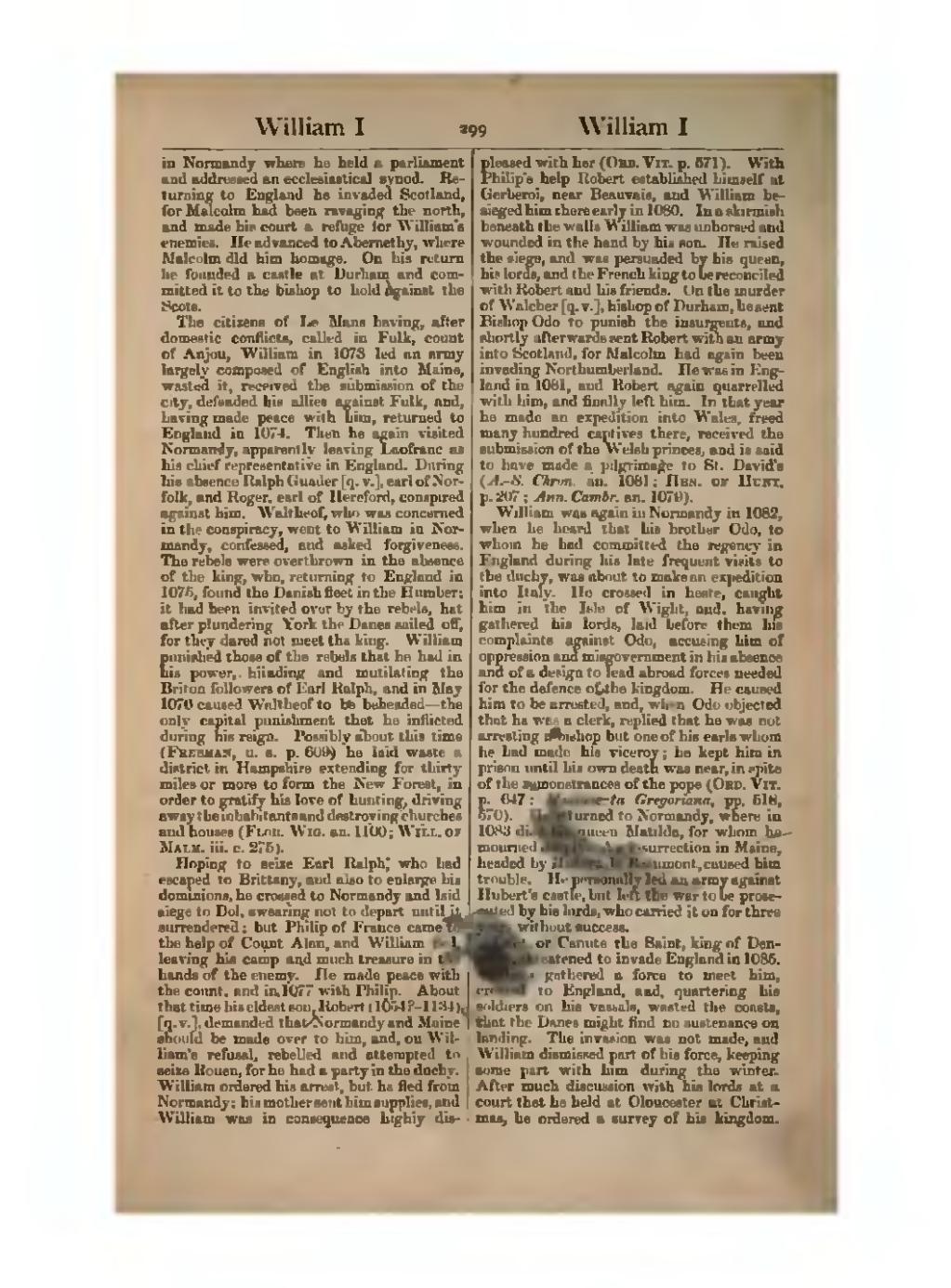in Normandy where he held a parliament and addressed an ecclesiastical synod. Returning to England he invaded Scotland, for Malcolm had been ravaging the north, and made his court a refuge for William's enemies. He advanced to Abernethy, where Malcolm did him homage. On his return he founded a castle at Durham and committed it to the bishop to hold against the Scots.
The citizens of Le Mans having, after domestic conflicts, called in Fulk, count of Anjou, William in 1073 led an army largely composed of English into Maine, wasted it, received the submission of the city, defended his allies against Fulk, and, having made peace with him, returned to England in 1074. Then he again visited Normandy, apparently leaving Lanfranc as his chief representative in England. During his absence Ralph Guader [q. v.], earl of Norfolk, and Roger, earl of Hereford, conspired against him. Waltheof, who was concerned in the conspiracy, went to William in Normandy, confessed, and asked forgiveness. The rebels were overthrown in the absence of the king, who, returning to England in 1075, found the Danish fleet in the Humber; it had been invited over by the rebels, but after plundering York the Danes sailed off, for they dared not meet the king. William punished those of the rebels that he had in his power, blinding and mutilating the Briton followers of Earl Ralph, and in May 1076 caused Waltheof to be beheaded—the only capital punishment that he inflicted during his reign. Possibly about this time (Freeman, u. s. p. 609) he laid waste a district in Hampshire extending for thirty miles or more to form the New Forest, in order to gratify his love of hunting, driving away the inhabitants and destroying churches and houses (Flor. Wig. an. 1100; Will. of Malm. iii. c. 275).
Hoping to seize Earl Ralph, who had escaped to Brittany, and also to enlarge his dominions, he crossed to Normandy and laid siege to Dol, swearing not to depart until it surrendered; but Philip of France came to the help of Count Alan, and William fled, leaving his camp and much treasure in the hands of the enemy. He made peace with the count, and in 1077 with Philip. About that time his eldest son, Robert (1054?–1134) [q. v.], demanded that Normandy and Maine should be made over to him, and, on William's refusal, rebelled and attempted to seize Rouen, for he had a party in the duchy. William ordered his arrest, but he fled from Normandy; his mother sent him supplies, and William was in consequence highly displeased with her (Ord. Vit. p. 571). With Philip's help Robert established himself at Gerberoi, near Beauvais, and William besieged him there early in 1080. In a skirmish beneath the walls William was unhorsed and wounded in the hand by his son. He raised the siege, and was persuaded by his queen, his lords, and the French king to be reconciled with Robert and his friends. On the murder of Walcher [q. v.], bishop of Durham, he sent Bishop Odo to punish the insurgents, and shortly afterwards sent Robert with an army into Scotland, for Malcolm had again been invading Northumberland. He was in England in 1081, and Robert again quarrelled with him, and finally left him. In that year he made an expedition into Wales, freed many hundred captives there, received the submission of the Welsh princes, and is said to have made a pilgrimage to St. David's (A.-S. Chron. an. 1081; Hen. of Hunt. p. 207; Ann. Cambr. an. 1079).
William was again in Normandy in 1082, when he heard that his brother Odo, to whom he had committed the regency in England during his late frequent visits to the duchy, was about to make an expedition into Italy. He crossed in haste, caught him in the Isle of Wight, and, having gathered his lords, laid before them his complaints against Odo, accusing him of oppression and misgovernment in his absence and of a design to lead abroad forces needed for the defence of the kingdom. He caused him to be arrested, and, when Odo objected that he was a clerk, replied that he was not arresting a bishop but one of his earls whom he had made his viceroy; he kept him in prison until his own death was near, in spite of the remonstrances of the pope (Ord. Vit. p. 647; Monumenta Gregoriana, pp. 518, 570). He returned to Normandy, where in 1083 died his queen Matilda, for whom he mourned deeply. An insurrection in Maine, headed by Hubert de Beaumont, caused him trouble. He personally led an army against Hubert's castle, but left the war to be prosecuted by his lords, who carried it on for three years without success.
Cnut, or Canute the Saint, king of Denmark, threatened to invade England in 1085. William gathered a force to meet him, crossed to England, and, quartering his soldiers on his vassals, wasted the coasts, that the Danes might find no sustenance on landing. The invasion was not made, and William dismissed part of his force, keeping some part with him during the winter. After much discussion with his lords at a court that he held at Gloucester at Christmas, he ordered a survey of his kingdom.
